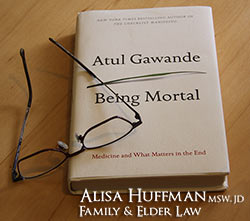|
The timing of reading a book sometimes makes all the difference. If you are reading my blog, Atul Gawande’s Being Mortal might just be the right book at the right time for you. Gawande is an experienced surgeon who tells his professional story, a personal journey from ignorance to understanding about aging.
Are you or were you a caregiver for someone you love - your husband, your wife, your mother, your father? Are you thinking about how you want to age? Are you entertaining any thoughts that you might need the care of another person as you grow older? If so, this book is a great gift to give yourself. It might help you make important health care decisions for your loved ones or yourself. It also might give you peace of mind about health care decisions you have already made for loved ones.Gawande helps the reader understand what being mortal means, through stories about his patients and research that describes the aging process.
|
 |
One the themes in Being Mortal is that the process of aging and dying is normal, tragic, and inevitable. Gawande shares research that explains what happens to our bodies as we age and reach the end of life. He describes how our teeth, bones, muscles, eyes, skin, hair, hands, heart, brains and lungs decline over time. Gawande says that “the story of aging is the story of our parts.” As deficiencies in our complex bodies increase, the time comes when just one more problem is enough to weaken the whole and we become frail. If we are privledged enough to live a long life, becoming frail is a normal part of our mortality.
When we are frail, a precipitating event, like a fall, or pneumonia, may lead to death. But in our fight against old age and dying, we too often perceive an illness as a battle that must be fought resulting in a winner and a loser. Many of us don’t want to think about dying, much less talk about it or even accept that there is a 100% chance that we will all die. The very act of thinking about the possibility of our own death, and talking about it with loved ones and professionals, could help us understand our mortality, and make it a shared rather than a lonely experience.
In my next blog, I will talk about another theme in Gawande’s Being Mortal: why doctors don’t usually help us to come to terms with aging and dying, and how this could change.